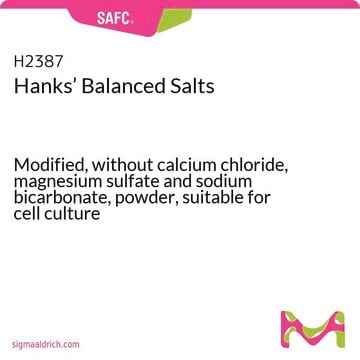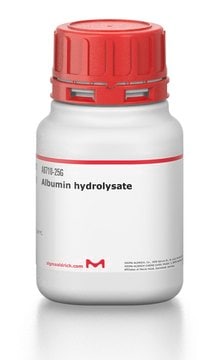H1641
Hanks′ Balanced Salt Solution 10x
Without sodium bicarbonate, 10 ×, liquid, sterile-filtered, suitable for cell culture
Synonym(s):
Hanks’ Balanced Salt solution
Sign Into View Organizational & Contract Pricing
All Photos(1)
About This Item
UNSPSC Code:
12352207
NACRES:
NA.75
Recommended Products
sterility
sterile-filtered
form
liquid
concentration
10 ×
technique(s)
cell culture | mammalian: suitable
impurities
endotoxin, tested
Looking for similar products? Visit Product Comparison Guide
General description
Balanced salt solution (BSS) plays an important role in cell culture as they provide a buffering system to maintain the medium within the optimum pH range (7.2-7.6). It also serves as an irrigating, transporting, and diluting agent to maintain the osmotic balance between intra- and extracellular spaces. BSS provides cells with water, inorganic ions, and energy for normal cell metabolism.
Application
Hanks′ Balanced Salt Solution 10x has been used:
- to culture cerebella slices from rats
- in Giardia duodenalis isolation
- as a component of the dissection media for the storage of corpus callosum slices from mice
Reconstitution
Supplement with 0.35 g/L sodium bicarbonate at 1×.
Storage Class
12 - Non Combustible Liquids
wgk_germany
WGK 1
flash_point_f
Not applicable
flash_point_c
Not applicable
Certificates of Analysis (COA)
Search for Certificates of Analysis (COA) by entering the products Lot/Batch Number. Lot and Batch Numbers can be found on a product’s label following the words ‘Lot’ or ‘Batch’.
Already Own This Product?
Find documentation for the products that you have recently purchased in the Document Library.
Customers Also Viewed
Jae Jun Sim et al.
Methods and protocols, 3(2) (2020-05-01)
In this protocol, we introduced a method of measuring mitochondrial dysfunction to confirm the epithelial-mesenchymal transition (EMT) in pancreatic cancer cells under a hypoxic environment. There are many expertized and complicated methods to verify EMT. However, our methods have indicated
Sarah C Power et al.
Scientific reports, 8(1), 17013-17013 (2018-11-20)
Nocturnal mice fed in the middle of the light period exhibit food anticipatory rhythms of behavior and physiology under control of food-entrainable circadian clocks in the brain and body. This is presumed to be adaptive by aligning behavior and physiology
Nora L Salaberry et al.
Molecular neurobiology, 54(7), 5327-5334 (2016-09-02)
Circadian rhythms are strongly affected by drugs. In rodents, chronic methamphetamine (METH) intake changes circadian activity rhythms, mainly by altering light synchronization that generates the expression of a free-running rhythm with a period longer than 24 h and a second behavioral
Shenghui Liu et al.
iScience, 24(9), 103003-103003 (2021-09-11)
Recent research has indicated the adult liver Sox9+ cells located in the portal triads contribute to the physiological maintenance of liver mass and injury repair. However, the physiology and pathology regulation mechanisms of adult liver Sox9+ cells remain unknown. Here
Nora L Salaberry et al.
Brain structure & function, 224(1), 19-31 (2018-09-23)
For many years, the suprachiasmatic nucleus (SCN) was considered as the unique circadian pacemaker in the mammalian brain. Currently, it is known that other brain areas are able to oscillate in a circadian manner. However, many of them are dependent
Our team of scientists has experience in all areas of research including Life Science, Material Science, Chemical Synthesis, Chromatography, Analytical and many others.
Contact Technical Service







